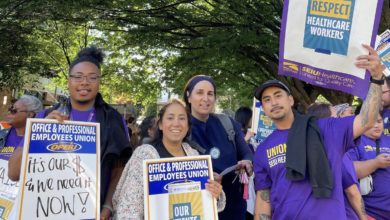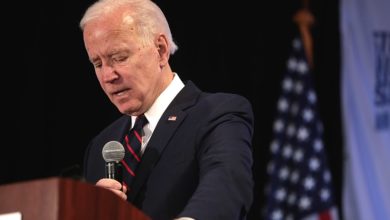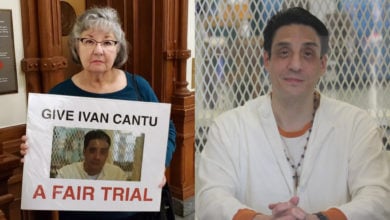It is common knowledge that health care under capitalism is only guaranteed to those who can afford it. Policies like universal health care have increased in popularity in recent years, yet the United States is still the only high-income nation without a nationalized health care system. The health-wealth gap is also blatant in the United States — low-income people are five times more likely to be in poor health than the wealthy, and have life expectancies that are up to 15 years shorter. Poor people are at higher risk for chronic illnesses and other poor health outcomes, yet they have the most difficulty accessing medical care. In short, capitalism makes us sick and then denies us the right to get better. In addition to its more transparent anti-poor practices, the for-profit capitalist health care system also uses deceptive workarounds to deny life-saving medical care even to individuals who are supposed to be covered under Medicaid and other government health insurance programs. Here are four sneaky ways capitalist health care kills poor people.
- Administrative burdens
Administrative burdens are the tasks that create a gap between the care doctors want to give and the care patients receive — paperwork, wait times, insurance procedures and more. They are created by insurance companies, pharmaceutical companies, lack of government oversight and profit-seeking hospitals. In an essay published in the New York Times, maternal-fetal medicine physician Dr. Chavi Karkowsky writes that her “average Wednesday” involves seeing several patients who are unable to access necessary supplies or medications because of administrative burdens. She blames medical bureaucracy for the issue: The unpaid labor patients and doctors must take on in order to access medical care is increasing because insurers and hospitals prioritize reducing costs over patient treatment. The poorest working-class patients — those working low-wage jobs, those who do not speak English, and those who must fight to stay on Medicaid — are most impacted by administrative burden. Without paid time off or child care, working-class people don’t have days or hours to spend on administrative burdens, and the wait time can cost them their lives.
- Medicaid denials
Many people in the United States rely on the federal Medicaid program to access the care that they need, but this program baselessly denies coverage to working-class people at increasing rates. Since 1965, Medicaid has provided health insurance coverage to certain low-income Americans. Powerful lobbying organizations like the American Medical Association have historically opposed all government provision of health care, and this program was only made possible by mobilizations of Black doctors, civil rights and feminist movement leaders and grassroots organizations, which fought to secure health care for poor people. However, Medicaid falls short of activists’ demands for universal health coverage. More recently, as president, Barack Obama campaigned on health care reform, leading to the Affordable Care Act, which expanded Medicaid access but still left millions uninsured.
Since the beginning of the COVID-19 pandemic, 3.8 million people have lost Medicaid coverage for reasons unrelated to their eligibility, and this is an underestimate because only 38 states make the information available. Of these, three quarters of patients lost coverage because of administrative burdens. Barriers to renewing plans include state mistakes like mailing notices to the wrong address, failing to mail notices altogether and insisting that the patient submit different paperwork. Paperwork is often confusing and time consuming, leading Medicaid recipients to submit it late and have their care delayed or removed as a result.
While the federal government provides most of the funding for Medicaid, individual states are responsible for setting standards and handling renewals, and oversight is notoriously lacking. The federal government mandates that states automatically renew people’s coverage using electronic data like wage records from food stamps and other benefits programs, but most states still require burdensome yearly renewals. As of July, 12 states violated this mandate. For example, in Florida alone, 200,000 people lost Medicaid coverage this year for procedural reasons, but the state refuses to collaborate with the federal government to minimize removals. The federal government has done little to remedy these injustices.
The most desperate people in the poorest states are the most affected by cutoffs — take West Virginia, where one third of residents rely on Medicaid. There, clinics have been forced to reject people when they show up for their appointments having unknowingly become uninsured. At just one clinic, the Charleston West Virginia Health Clinic, 1,600 patients lost coverage between May and July. Heather Elkins is a patient in West Virginia who had to leave the workforce because she suffers from several chronic health conditions including lung disease, which was partly caused by breathing lime dust at her former construction job. Earlier this year when she tried to pick up her prescriptions, Elkins found out she had been kicked off of Medicaid, and was unable to access medication to treat her chronic obstructive pulmonary lung disease. She never received notice of the cutoff. Two months later she was back on Medicaid, but it is criminal that health care be denied healthcare for any period of time.
Capitalism makes us sick and denies us the right to get better. At a moment’s notice, patients can lose access to life-saving medications. In the richest country in the world, the government chooses to spend billions of dollars every year on projects that do not serve working-class people like funding the military machine, but fails to follow through on their promise of providing health care to Medicaid patients.
- Denials by private insurance companies
Patients who do manage to access Medicaid still face denials from insurance companies. Three quarters of Medicaid patients recieve care through private insurance companies, which are paid a fixed amount per patient by the federal government. Other subscribers pay for every individual visit, drug, and procedure, so insurance companies make less money when insuring Medicaid patients. This gives the companies an incentive to deny Medicaid patients coverage because to them profit is more important than human lives. It is typical for for-profit insurance companies to deny care to Medicaid patients at rates up to 25%. Elevance has denial rates of up to 34% and Molina has denial rates reaching 41% in some states. Some insurers claim that they only deny procedures that are not medically necessary, but this claim was disproved in a 2022 federal report, which found that insurers deny thousands of authorization requests for necessary procedures every year. Insurance company denials create yet another administrative barrier for working-class people, many of whom don’t have time to wait for insurers to approve their care. When the state fails to intervene, patients who are denied coverage choose between medical debt and ongoing illness or even death.
- Hospital greed and understaffing
Like insurance companies, hospitals in the United States also create barriers to patient care. Hospitals deliberately understaff themselves to make more money, which creates increased wait times and leaves doctors with less time to spend with each patient. A longer wait time in the emergency room can be the difference between life and death for a patient, and shorter check-ups can lead physicians to overlook life-threatening health issues. Understaffing also increases administrative burdens on both patients and doctors.
In many areas, the only medical care available is at a for-profit hospital, meaning that for many working-class people, health care is out of reach. So-called “non-profit” hospitals receive significant tax breaks by promising to provide charity health care to patients in need. However, many “non-profit” hospitals have recently come under fire for illegally charging low-income people for their procedures, leaving patients in medical debt while they reap billions of dollars in profits. These hospitals use the tax incentives designed to promote health care access for poor people, and then screw those patients over to increase their profits.
Physicians are increasingly dissatisfied with the cruelty of our hospitals and insurance companies. In 2021, 117,000 physicians left the workforce, many of them citing burnout, while fewer than 40,000 joined it. Nearly two-thirds of physicians report burnout, which is attributed to the demoralization that comes with repeatedly being unable to provide patients with the care they need under the for-profit health care system. Doctors like Dr. Eric Reinhart, a physician at Northwestern University, have pivoted towards political mobilization to oppose the unjust capitalist health care system, calling for the reorganization of U.S. medical care towards prioritizing patient care over profits.
The common thread connecting health care access barriers like Medicaid denials, private insurance company denials, and hospital greed and understaffing is that capitalist health care prioritizes profit over working-class people’s lives. Tens of thousands of preventable deaths occur every year because people cannot afford health care. No one should have to choose between being sick or dying and going into medical debt. We need to eliminate private insurance companies, pharmaceutical companies and other exploitative corporations, and redirect their profits towards providing health care for all. This is impossible under capitalism. A socialist system would make health care a human right. As we saw with the fight for Medicare and Medicaid, only by organizing for change can we achieve a just health care system. We need socialism — our lives depend on it!






